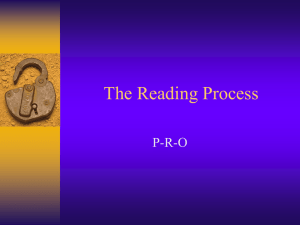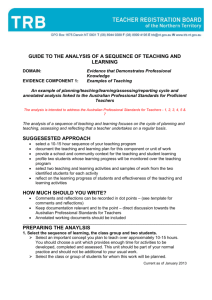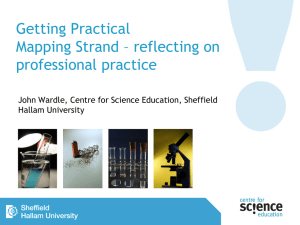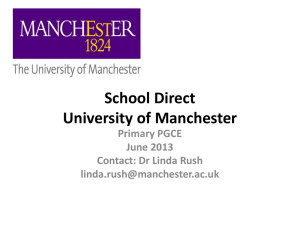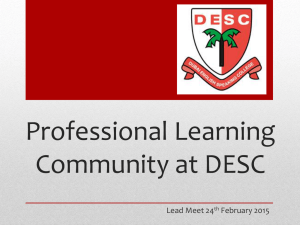File - Alicia Burdess
advertisement
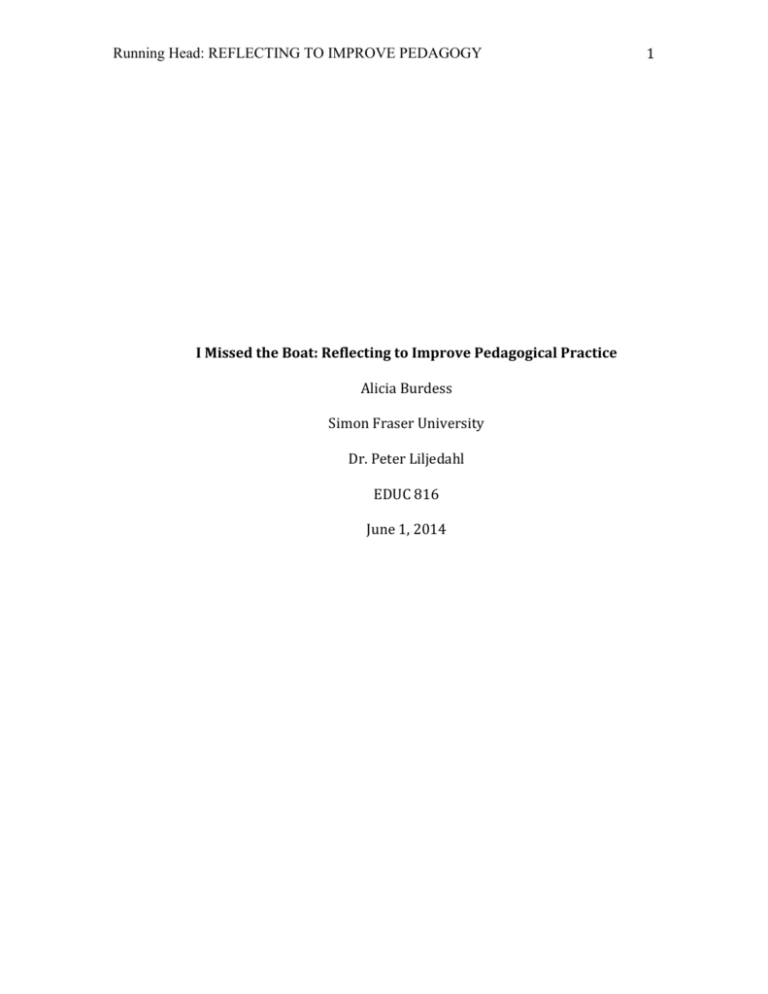
Running Head: REFLECTING TO IMPROVE PEDAGOGY I Missed the Boat: Reflecting to Improve Pedagogical Practice Alicia Burdess Simon Fraser University Dr. Peter Liljedahl EDUC 816 June 1, 2014 1 Running Head: REFLECTING TO IMPROVE PEDAGOGY 2 Teaching is trying to stay afloat on the open sea; it is finding balance, negotiating tensions, taking risks, and seizing opportunities. I often feel like I am adrift in the middle of the ocean. Sometimes I am searching for Utopia, and it feels like an adventure, full of discovery and growth. Other times, I am scrambling to use the available materials to repair my ship and to reach safety. The majority of the time, I am trying to sail on a solid foundation (a thinking classroom) while attempting to improve my pedagogical practices. “We are like sailors who must rebuild their ship on the open sea, never able to dismantle it in dry-dock and to newly build it there from the best parts” (Otto Neurath, 1923/33). I am continuously trying to negotiate the teaching landscape while trying to become a more effective teacher, developing a community of thinkers and best practices. So, how do we rebuild our practice while on the open sea? How do we make use of reflection in our practice? I act, I reflect, and I react. I use reflection as a teacher, as a teacher-researcher, and through the observations of colleagues in order to behave more purposefully and improve the learning in my classroom (my students’ and my own). In his book, Activating the Desire to Learn, Bob Sullo discusses William Glasser’s choice theory. He states, “Behaviour is always purposeful. It is designed to maintain or restore balance so that what I perceive closely approximates what I want. This process of wanting, perceiving, comparing, and acting is never-ending, as we continually strive to satisfy the needs that motivate us: to connect (to belong), to be powerful (to be competent), to be free (to make choices), to be playful (to have fun and to discover), and to survive (to be safe)” (Sullo, 2007, p. 14). Running Head: REFLECTING TO IMPROVE PEDAGOGY 3 As a beginning teacher, I often acted without thinking and did not think about my actions afterward; I was too stressed and too busy surviving to reflect on my behaviour in the classroom. The only reflection that I remember doing was on the behaviour of my students. I remember spending a lot of time and energy trying to change their behaviour in order to try to improve their learning. Fast-forward nine years; my outlook has dramatically changed. I have realized that my behaviour, my decisions, and my attitudes are powerful influences in the classroom. The more I reflect on me as a teacher, the more I improve the learning of my students. I now act more deliberately; my teacher moves are researched and planned. I use vertical surfaces, random groups, movement, and questioning with a purpose. I use technology to help me observe my students and myself. I specifically choose lowfloor, high-ceiling tasks to teach problem solving, collaboration, risk taking, perseverance, communication, as well as curriculum and mathematical skills. I purposefully pick my modes of assessment to allow the students to communicate mathematically, to present their work, explain their thinking, and showcase their understanding. I pay attention, I notice, and I wonder. I read research, I learn in my Master’s classes, and I discuss with my colleagues and professors. I make mistakes, I try new things, and I ask different questions. The more I reflect on what I am doing in my classroom, the more I see what is actually happening. The more I reflect on the students’ thinking and understanding, as well as their behaviours, the more I wonder how I could improve learning. Running Head: REFLECTING TO IMPROVE PEDAGOGY 4 As a teacher-researcher, the tool that has helped me to reflect the most deeply has been the teaching dilemma. Adler explains in her book Teaching Mathematics in Multilingual Classrooms, “Teaching dilemmas are at once explanatory tools and analytic devices for teaching. They make explicit the tensions inherent in teaching, tensions that are at once personal and contextual. Teachers can use a language of dilemmas to reflect on and transform their practices so as to meet the mathematical needs of their linguistically diverse learners” (Adler, 2001, p. 1). One of my dilemmas is the use of language in a French Immersion classroom. Through my research of how students use language to learn mathematics, I was able to observe and reflect on my students learning processes as well as on my teaching practice. This has been a powerful and enlightening journey for me, often challenging and frustrating for my students and myself. I have been able to inspire my teaching through my research and have made changes in my classroom to allow me to manoeuvre within the dimensions of my dilemma. My research ended up not just being about the research; it became a way of learning about my students and learning about myself as a teacher. As I questioned them, I also questioned myself. Teaching became, at the same time, more complex and rewarding, yet more challenging and frustrating. I questioned the status quo; I questioned our school and education systems’ traditions; I questioned the way I was taught and the way we continue to teach. Mason resonates with my thoughts, “Researching can be a creative experience, generating thoughts and creating new ways of seeing. It can temporarily alter events, often juxtaposing them in a way that allows re-viewing, which, in turn, can result in the creation of new meaning. What I particularly enjoy Running Head: REFLECTING TO IMPROVE PEDAGOGY 5 about research is the power of reflection and the freedom that new associations of ideas bring” (Mason, 2002, p. 29). From my experiences as a teacher-researcher, I have become more perceptive, more curious, and more passionate about change. I seek out academic articles, professional development opportunities, teacher committees, and colleagues who are inspired to learn, to work together, and to improve education. Having colleagues in my classroom has been a strong motive and tool to reflect on my practice. The mere fact of having someone else in my classroom has provided me with a window to myself, to my choices, to my teaching skills. It has made me question my classroom community, my teacher moves, and my students’ learning. Having a colleague in my classroom has let me look more deeply at my teaching practice. I think that it is comparable to watching a video recording of myself, but better, as I am able to engage with the camera, ask it questions and use it to bounce ideas off of. Having an active observer asking questions about my thoughts and actions while teaching enables me to observe myself from an outside perspective and ask myself these same questions. Dawn was a weekly guest in my classroom working on her research project on Teachers Changing their Practice. I also had a researcher from the University of Alberta (Martine) join us regularly looking at Language Learning through the use of Technology. Both of these people have become important members of my learning community. Their presence has provided me with a safe place to take risks, to hypothesis, and to test. They have Running Head: REFLECTING TO IMPROVE PEDAGOGY 6 provided me with knowledge, courage and support. The discussions I have had with them have given me invaluable information regarding what they see in my classroom as well as a starting place to make change and look to the future. Since completing my teaching practicums and my first year evaluations, I have not had a chance to receive immediate and precise feedback on my teaching. I have not had many occasions to talk about specific events, ideas, and questions directly related to my lessons. It is immensely rich learning to have someone else’s point of view, to hear their ideas and feedback, to feel their encouragement and support. I would often stop what I was doing with students to ask their opinion, seek advice, or reflect on what I was noticing in live time. We would follow up our work with meetings after school or over supper. We would talk about teaching and learning for hours. I cannot express how important these conversations have become. They keep me inspired and motivated. Dr. Martine Pellerin, the U of A researcher, stated that the best thing that a student teacher has said to her is “J’ai manqué le bateau, mais je réfléchis sur mon enseignement et je peux l’améliorer la prochaine fois” (I missed the boat, but I am reflecting on my teaching and I can do better next time). During a discussion with her regarding reflection, we talked about how we might not always know where we want to go as teachers, but we will always look to the horizon and we will stay afloat until we get somewhere. Running Head: REFLECTING TO IMPROVE PEDAGOGY 7 Reflection has been the most practical and influential tool used to change my practice and rebuild my boat. I have been able to reflect on my pedagogical decisions, my teacher moves and gambits, and my students' learning through dayto-day actions, reflections, and reactions. I have been able to enrich my reflection process through researching my own classroom and collaborating with colleagues in my learning community. This voyage has taught me that I am not alone at sea. I have been able to access tools, building supplies, and a crew of people to help me rebuild my boat, not only to keep me afloat, but also to continue my journey of professional growth and development, to become a better learner and teacher. I have been able to make small corrections to modify my course, I am more confident negotiating the rough waters, and I rely more on collaboration with my crew to help me become a better sailor. I agree with Sullo (2007), and I will continually strive to belong, to be competent, to make choices, to discover, and to be safe. Not surprisingly, these are also the needs I aim to help my students fulfil as mathematical learners, responsible citizens, and happy people. Running Head: REFLECTING TO IMPROVE PEDAGOGY References Adler, J. (2001). Teaching Mathematics in Multilingual Classrooms. The Netherlands: Kluwer Academic Publishers. Mason, J. (2002). Researching Your Own Practices: The Discipline of Noticing. London: Routledge Falmer. Sullo, B. (2007). Activating the Desire to Learn. Alexandria, Virginia, USA: Association for Supervision and Curriculum Development. 8

